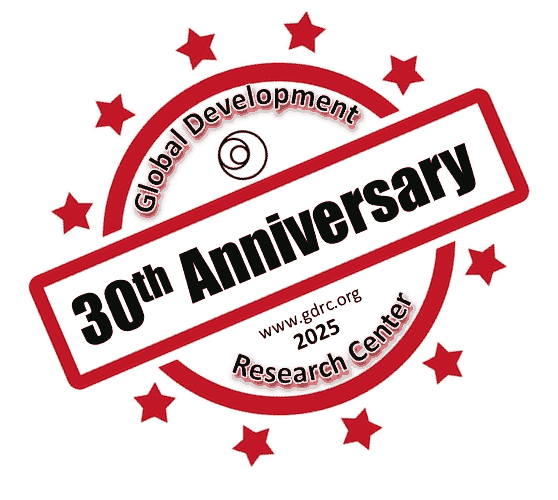Thirty Years of GDRC:
Looking at the Past to See the Future
 In 1995, what started as an extension of my PhD research at the Tokyo Institute of Technology evolved into something much larger - the Global Development Research Center (GDRC). Initially a modest, static website hosted on the university's server, GDRC was a collection of original research and carefully curated links focused on microfinance issues. Half original content, half curated navigation, it was my small contribution to the growing world of the World Wide Web.
In 1995, what started as an extension of my PhD research at the Tokyo Institute of Technology evolved into something much larger - the Global Development Research Center (GDRC). Initially a modest, static website hosted on the university's server, GDRC was a collection of original research and carefully curated links focused on microfinance issues. Half original content, half curated navigation, it was my small contribution to the growing world of the World Wide Web.
In those early days, internet access was mostly academic. Mosaic, and then Netscape, opened a new universe, letting us connect globally beyond just university networks. I still remember the excitement of using the Netscape browser at Tokyo Tech, realizing that information from around the world was just a click away.
By 1996-1999, GDRC had expanded beyond its initial research focus. Programmes on Microfinance, Urban Environmental Management, NGOs, and Information Design were added. These thematic areas aligned with emerging global development priorities and provided a structured platform for users to explore complex issues through both curated knowledge and new research.
One of the proudest milestones came in 2000, when several GDRC programmes were recognized as nodes of the WWW Virtual Library - the oldest and most prestigious internet library, started by Tim Berners-Lee. It was a validation of GDRC's credibility, usefulness, and impact at a time when much of the internet was still a new frontier.
The early 2000s marked GDRC's transition to a commercial hosting environment - as www.gdrc.org - giving it the flexibility and autonomy to reach broader audiences while staying true to its mission. Throughout the years, GDRC resisted the pressure to commercialize or become overly institutionalized, choosing instead to maintain a clear focus on knowledge-sharing, public service, and accessibility.
Today, nearly 30 years later, GDRC remains a living archive of development thinking, policy innovation, and grassroots knowledge. The Wayback Machine captures some of its many iterations, but the real legacy lies in its quiet, consistent presence: a trusted resource for students, practitioners, and researchers across the world.
Over the years, GDRC has evolved into a knowledge platform organized into 15 research programmes, grouped under five thematic spheres. Each programme reflects a commitment to building bridges between theory, practice, and policy.
-
 SPHERE OF ENVIRONMENT:
SPHERE OF ENVIRONMENT:
1. Environmental Decision-Making
2. Sustainable Development
3. Oceans, Coasts and Small Islands
SPHERE OF URBAN:
4. Urban Environmental Management
5. Urban Governance
6. Urban Heritage and Conservation
SPHERE OF COMMUNITY:
7. NGOs and Civil Society
8. Gender and Development
9. Microfinance
SPHERE OF ECONOMY:
10. Informal Sector
11. Technology Transfer
12. Sustainable Businesses
SPHERE OF INFORMATION:
13. Internet and ICTs
14. Knowledge Management
15. Information Design
Looking to the Future:
The Challenge of Original Content in the Age of AI
As we look to the future, we are faced with both challenges and exciting opportunities. The rapid advancement of AI and machine learning has made vast amounts of information available instantly, but it has also raised critical questions about the authenticity, credibility, and ownership of content. In this age of algorithms and automation, original content has never been more valuable.
For GDRC, this presents both an opportunity and a responsibility. While AI tools can efficiently gather, analyze, and disseminate information, they cannot replicate the unique perspectives, lived experiences, and in-depth analysis that human knowledge and research provide. The need for original, human-generated content remains essential - content that reflects our collective understanding, fosters deep thinking, and addresses real-world issues in ways AI cannot.
As GDRC enters its next chapter, our commitment to authenticity and knowledge-sharing will remain steadfast. We will continue to provide valuable resources, but we also intend to be a leader in promoting critical thinking and human-centered solutions in a world increasingly shaped by artificial intelligence. It is through our continued focus on original content - combining expert insights, community-driven research, and real-world applications - that GDRC will remain a beacon of knowledge in an ever-evolving digital landscape.
Hari Srinivas
Coordinator, Global Development Research Center (GDRC)
|